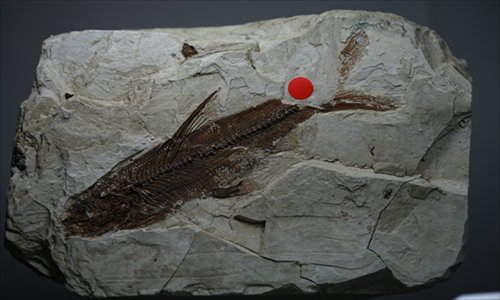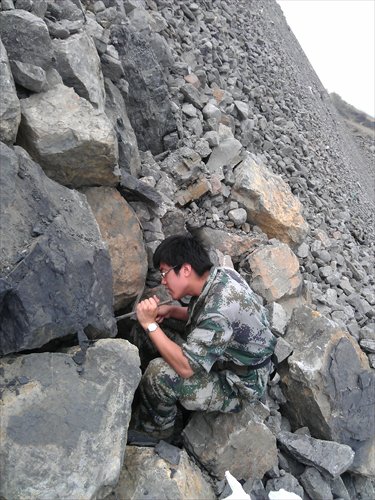

Cui's collection includes a fossil of Xenocypris, a fish that lived 5.3 to 1.8 million years ago. Photo: Courtesy of Cui Shicheng

Cui Shicheng digs for fossils in Shanxi Province. Photo: Courtesy of Cui Shicheng
One day, maybe in the late Jurassic Period, a fish named Lycoptera swam too close to a volcano as it erupted. Hot ash spewed into the water, choking off the oxygen supply and burying the marine life. Millions of years later, when the area had become known as Liaoning Province, human beings unearthed Lycoptera and marveled at how perfectly it had been preserved.
The person telling the story is Cui Shichen, a fossil collector. Although he's spent a long day at his job as an F&B trainer, Cui is clearly energized by the topic.
He began collecting fossils in middle school, when his biology teacher gave him a pair of rocks imprinted with the remains of an ancient fish. For Cui, these two rocks were a key to the realm of ancient creatures, and a concrete manifestation of the scientific theory of evolution.
Cui's collection, which now numbers in the low hundreds, includes specimens he excavated himself as well as some purchased or received in trade from other fossil fans.
Novices typically collect everything from insects, plants, spiral shells and vertebrates. As collectors learn more about the primitive species, Cui said, they begin to specialize. Personally, he prefers fish from the Cambrian to the Pleistocene.
"My family doesn't understand why I spend money and time on fossils, which have nothing to do with my job and takes up space in our house," Cui said. However, he has in fact used his fossil knowledge in his training classes; to motivate employees to perform better, he discusses the "survival of the fittest" imperative of evolutionary biology.
"Our modern society seems not that different from the ancient world. In order to survive, one must figure out a way to improve," he said.
Collectors who relish the act of unearthing fossils organize digs in places like Yunnan, Sichuan and Guizhou provinces. Careful to avoid nationally protected areas, they tend to instead target mines and new construction sites.
Other collectors become skillful in restoration, the process of "cleaning" the fossil by delicately scraping away the surrounding stone with scalpels and brushes under a microscope. Depending on the hardness of the bedrock that the organisms are embedded in, this work can range from a couple of hours to years.
"The longest restoration I ever did took about two years," Cui said. "I didn't feel very excited after completing it, though my friends were all amazed by the final results. Maybe it was because I was staring at the fossil every day," he said. Since amateur restorers like Cui are all self-taught, they meet regularly to exchange tips on technique.
Some amateur collectors eventually become professional dealers, buying and selling fossilized species that are not nationally protected due to scientific value and rarity. One of them is a Beijing-based businessman surnamed Luo, who became obsessed at a young age with the spiral snail fossils plentiful in Guangxi Zhuang Autonomous Region, where he grew up.
Luo believes that fossil-related businesses in China have great potential to develop, but notes that because illegal digging and fake fossils are rampant, it's crucial for China to establish more oversight of the fossil trade.
Cui, along with two friends, plans to set up a workshop in Beijing to promote the collection and study of fossils. "Some people like fossils and want to possess them. Others, like me, love fossils so much that we want to protect them better," he said.
Copyright ©1999-2018
Chinanews.com. All rights reserved.
Reproduction in whole or in part without permission is prohibited.